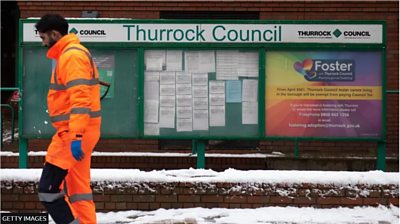A Βι¶ΉΤΌΕΔ Shared Data Unit analysis of data by the Department for Levelling Up, Housing and Communities shows UK councils owe a combined £97.8bn to lenders, equivalent to £1,455 per resident, as of September 2023.
Taking into account all types of local authorities, such as police and crime commissioners and combined authorities, the debt pile rose to £122bn.
High levels of local authority debt would see residents face an "extreme and long-lasting" impact on local services, the Public Accounts Committee warned.
But council leaders said years of government under-funding meant they had been forced to take out loans and invest in commercial properties just to keep services running.
Background and briefing
A full .
This analysis provides further insight into the financial condition of councils after the investigation the Βι¶ΉΤΌΕΔ Shared Data Unit published in August 2023 revealing a £5bn black hole in town hall budgets (see the , and ).
Get the data
- Shared spreadsheet: (also as a )
- Council debt data by the Department for Levelling Up, Housing and Communities:
- ONS population figures: . This excludes Westmorland and Furness and Cumberland, both created in April 2023. Their population figures were obtained from their websites ( and )
Visualisation
Bar chart: UK councils with the largest average debt per resident - Outstanding debt as of September 2023
Interviews and quotes
- Jonathan Carr West, chief executive of the Local Government Information Unit
- Andy Carter, MP for South Warrington, who has criticised his council for acting "like a hedge fund"
- Dame Meg Hillier MP, Chair of the Public Accounts Committee
- A spokesperson for the Department for Levelling Up, Housing and Communities (DLUHC)
- A spokesperson for the District Councils’ Network
- A spokesperson for the Local Government Association
- Spokespeople for the local authorities of Woking, South Tyneside, East Lothian, Spelthorne, Warrington, Thurrock, Runnymede and Barking and Dagenham.
Βι¶ΉΤΌΕΔ and partner usage
This investigation featured across Βι¶ΉΤΌΕΔ platforms on the 16th of January 2024 and was the most read in the Βι¶ΉΤΌΕΔ News website. Some Βι¶ΉΤΌΕΔ political reporters also covered the story for their local area, including Beds, Herts & Bucks and Birmingham & Black Country.
The research got special features in some Βι¶ΉΤΌΕΔ radio outlets, such as Βι¶ΉΤΌΕΔ Radio Kent and Βι¶ΉΤΌΕΔ Radio Sheffield, and .
The Shared Data Unit makes data journalism available to news organisations across the media industry, as part of a partnership between the Βι¶ΉΤΌΕΔ and the News Media Association. The partnership generated over 70 stories, including:
- Aberdeen Live:
- Kent Online:
- Hampshire Chronicle:
- The Cornish Times:
- The Hunts Post:
- News & Star - The Cumberland News:
- Western Telegraph:
- East Lothian Courier:
- Southern Daily Echo:
The story also featured in the and both print and digital editions of .
Related repos
In August 2023, the Βι¶ΉΤΌΕΔ Shared Data Unit revealed that a black hole in local authority budgets continues to grow, prompting fears some will not be able to provide basic services ().
In July 2021, the Βι¶ΉΤΌΕΔ Shared Data Unit reported that UK councils faced a £3bn black hole in their budgets as they emerged from the coronavirus pandemic ().
